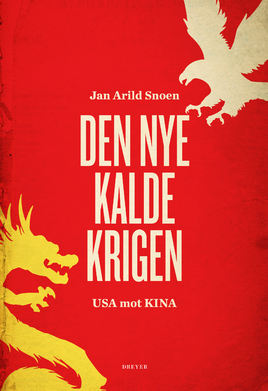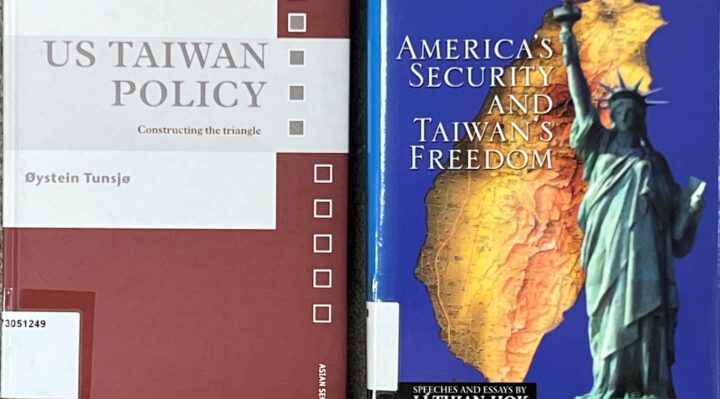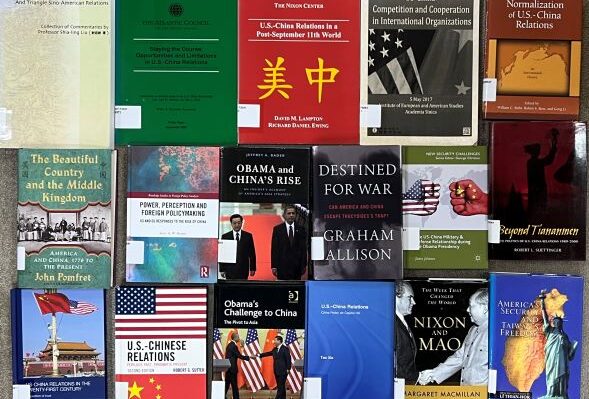+

Jan Arild Snoen (b. 1964) has for many years been a prominent analyst of American politics and society. In 2020 he published the book The Trump Shock. The US position is now being challenged by China, but Snoen argues that the US will remain the world’s leading power for the foreseeable future. The expected Chinese growth in the years to come is exaggerated.
– The US could outpace its economic rival for the first time in a half-century, Blomberg opinion by Daniel Moss writes in Taipei Times. –China’s economy is more than a weak spot in faltering global expansion. Growth this year is likely to fall short of Beijings own projection.
In 2019 the Australian China expert Richard McGreger’s little book “Xi JinPing: The Backlash” starts with the question: When did the world turn to China? Around the turn of the millennium, many were optimistic with hope that China could become a partner in the liberal world order. China became a member of the WTO in 2001 and won the Olympics in 2008 and 2022. This optimism has been replaced by resignation. The Xi regime has extinguished the hope that economic progress will lead China in a liberal direction.
The only thing Joe Biden continues with Donald Trump’s policies is a skeptical attitude towards China. The country challenges the United States’ dominant position in the world, and the US-led liberal world order after World War II. Now Europe is united against Russia because of the attack on Ukraine. Secretary of State Antony Blinken said Thursday last week that rather than Vladimir Putin’s Russia, it is China that represents the most potent and determined threat to the American-championed world today. “– But the intensifying fixation on China’s potential to disrupt the world order shrinks space for cooperation with Beijing and distracts from real treat in the world: Russia”, Zachary Karabell tells New York Times today. Karabell is a former portfolio manager of the China – U.S. Growth Fund with Fred Alger Managment. – We need to be cleareyed on China, he continues. – It is without doubt a more powerful potential adversary than Russia on every metric – military, economic and ideological. – China spends more on its military than any country besides the United States, which is intended to counter American military pre-eminence in East Asia. Rising nationalism is expected in the belief that Taiwan must be reunified with mainland China and that the South China Sea is Chinese lake. The Communist Party (CCP) views the United States as an adversary. But it has been willing to engage diplomatically, har repeatedly championed the inviolability of state borders and is not averse to self-interested compromise over issues like trade and climate change. It’s rhetoric over Taiwan has been little more than saber-rattling and appears restrained compared to how the United States had historically treated Latin America. – China is deeply intertwined with the U.S. and global economy. It holds more than a trillion dollars’ worth of America debt in the form of U.S. Treasury securities, benefits from the cumulative effect of U.S. investment in China and need access to foreign markets.
Norway sells salmon to China rather than forcing the country to change in return for Beijing’s reduced support for Kim Jong-un of North Korea. In todays New York Times Zachary Karabell’s opinion is that Biden should find new ways to work with China in return for Xi’s reduced support for Putin.
The author Jan Arild Snoen places the great power conflict in a historical and geopolitical context and tells it in relation to Norwegian conditions.

A stronger and more assertive China instead leads to increasing conflicts with the West, not least in trade policy. The regime’s increasingly authoritarian behavior and human rights violations, especially against the Uighurs and in Hong Kong, have contributed to a worsening of relations. If there is a military conflict, it is likely to strike in the South China Sea or Taiwan. The book has its own chapters on these areas. (https://www.forsvarsforeningen.no/norges-forsvar/norges-forsvar-6-2021/taiwan-frykter-angrep-fra-kina/?fbclid=IwAR0vzoqNPAt1rHevdZJcuJ9J_sdO-UmVHkW864D3A7flVnTizWkuxHUeGiE)
On March 1st. this year former chairman of the US Joint Chiefs of Staff Mike Mullen visited Taiwan together with Meghan O´Sullivan, former deputy national security adviser under former US president George W: Bush, and Michele Flournoy, a former undersecretary of defense in former US president Barak Obamas administration. A senior official in the Biden administration said the trip was to demonstrate continued robust support for Taiwan. Beijing don`t want anybody to visit or support democracy in Taiwan.
The next day former US state secretary Mike Pompeo visited Taiwan and urges US to recognize Republic of China (ROC) on Taiwan. He said if China takes Taiwan, it will tip the global balance.
In the beginning of April US Joint Chiefs of Staff Chairman General Mark Milley said US can provide Taiwan with Ukraine-style assistance. But on April 16th, former US national secretary adviser John Bolton called for US troops to be stationed in Taiwan to deter China from launching an invasion. This week US senator Tammy Duckworth went to visit Taiwan President Tsai Ing-wen in her office in Taipei. After the visit she told media that the US National Guard is planning to cooperate with the Taiwanese military. The Taiwan partnership act has received bipartisan support in the US Congress, although it has yet to become law.
On April 15th, the US senators and Lindsey Graham and Bob Menendez had a visit to President Tsai. Menendez knew that the Chinese government was “very unhappy” with their visit, but added that Beijing`s protest “did not dissuade us from coming” and supporting Taiwan also in the future.
- – With Taiwan producing 90 % of the world`s high-end semiconductor products, it is a country of global significance, consequence and impact, and therefore it should be understood the security of Taiwan has a global impact, Menendez said.
In May last month the US Department of State made major changes to the US-Taiwan relations fact sheet on its Web site. The former text “In the Joint Communique, the US recognized the government of the People`s Republic of China as the sole legal government of China, acknowledging the Chinese position that there is but one China and Taiwan as part of China” is removed. It now says “As a leading democracy and technological powerhouse, Taiwan is a key US partner in the Indo-Pacific” .
- “This kind of political manipulation on the Taiwan question is an attempt to change the status quo on the Taiwan Strait and will inevitably stir up a fire that only burns (the US). The US move is a petty act of fictionalizing and hollowing out the one China principle,” Chinese Ministry of Foreign Affairs spokesman Zhao Lijan said.
- – That the world is facing a new cold war is unlikely, Øystein Tunsjø told Aftenposten last week. He is a professor at the Norwegian Department of Defense Studies (IFS). There he researches China and RussiaHe has once been to Taiwan. (https://www.aftenposten.no/verden/i/wOBMyM/kina-vil-endevende-verden-frykter-usa-en-helt-ny-strategi-skal-holde-styr-paa-den-hurtigvoksende-rivalen?fbclid=IwAR2DMFm58q2nYtkc5f9RaYXg_FtHuQlX_zIWA6lcvqEwDjxTh48sCSronNU)
- – Today, the world is far more closely intertwined than during the Cold War, Tunsjø points out. – The United States and China have no choice but to deal with each other. But it is a relationship that will be marked by competition and conflict, and the time for unlimited free trade is over.
- – Although China’s power is growing, it is by no means a given that the country will eventually be able to compete with the United States, the publisher Dreyer says. – While the United States has allies around the world, China has very few. China also faces major challenges at home. The workforce is shrinking, while the number of older people is exploding. An enormous debt build-up, especially in the real estate sector, makes the economy vulnerable.
The Liberty Times had on May 18th a great editorial. It’s worth reading. China could not supplant the US: https://www.taipeitimes.com/News/editorials/archives/2022/05/18/2003778377.

Jan Arild Snoen has been to China a couple of times, but not to Taiwan. Because of Covid-19 and strict visa rules before that, he has not been to China for some years. So the information he has is based on the latest uncensored sources outside China. It is an important book for Norwegians to understand the background when reading the news between the two superpowers of the world.
Aftenposten published on May 24th, in collaboration with a number of major Western media, new documentation about the Xi dictatorship’s camp in Xinjiang. As the newspaper writes: “Now new documents and pictures shed a whole new light on what is probably the largest mass internment of people since the Holocaust.” Chapter 6 in Snoen`s book has the background information.
(Article behind pay-wall: https://www.aftenposten.no/verden/i/RrAr0A/kina-kaller-dem-skoler-nye-bilder-og-dokumenter-fra-leirene-avsloerer-en-helt-annen-historie?fbclid=IwAR3ZXNoRIM1CGQ-FX9PL6cy5UgWNsL9GWZRfkp5HA8ez5-mIsaPWgdoBiXc)
Norwegian Broadcasting and media were before we got internet mostly pro Mao during the former cold war. Jan Arild Snoen’s book is important as it gives Norwegians an enlightening contextualisation of elder views and myths about China.
Reporters in China have trouble obtaining neutral information and have previously written one-sidedly. That is why more and more journalists and authors are writing from outside of China.
You may also read Chinese Days Getting More Difficult For Media: https://www.norwaynews.com/chinese-days-getting-more-difficult-for-media
